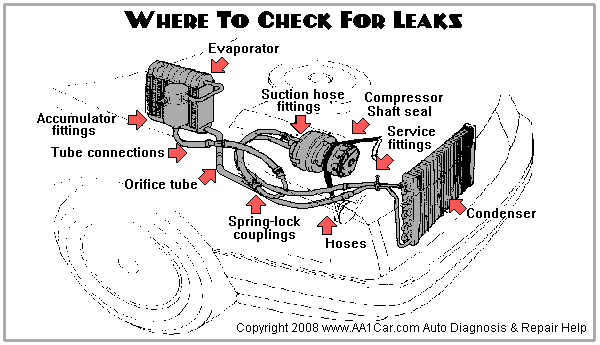Having a non-working air conditioning system in your car can be a frustrating and uncomfortable experience, especially during hot summer months. There are several possible reasons why your car’s air conditioning may not be working properly, and diagnosing the problem can help you determine the best course of action to fix it.
One of the most common reasons for a non-working air conditioning system is a refrigerant leak. If your car’s air conditioning is blowing warm or hot air, it could mean that there is a leak in the refrigerant system. You may also notice a decrease in cooling capacity over time. Checking for signs of refrigerant leak, such as oily spots or stains under the car, can help you identify if this is the cause of the problem.
Another possible reason for a non-working air conditioning system is a faulty compressor. The compressor is responsible for circulating refrigerant through the system, and if it is not functioning properly, the air conditioning will not work. Signs of a faulty compressor include strange noises coming from the engine or the air conditioning system not turning on at all. If you suspect a faulty compressor, it is recommended to have a professional inspect and replace it if necessary.
Common Causes of a Non-Working Car Air Conditioning
When the air conditioning in your car is not working, it can be very frustrating, especially during hot summer months. There can be several common causes for a non-working car air conditioning system. It is important to diagnose these issues correctly in order to get your AC back up and running smoothly.
Refrigerant Leak: One of the most common causes of a non-working car air conditioning is a refrigerant leak. The refrigerant is responsible for cooling the air in the system, and if there is a leak, the AC system may not be able to generate cold air. It is important to identify and fix any leaks in the system to prevent further damage.
Faulty Compressor: Another common cause of a non-working car air conditioning is a faulty compressor. The compressor is responsible for pressurizing the refrigerant and circulating it through the system. If the compressor is not functioning properly, the AC system may not be able to cool the air. A faulty compressor may need to be repaired or replaced.
- Electrical Issues: Electrical issues can also be a common cause of a non-working car air conditioning. If there is a problem with the electrical components of the AC system, such as a blown fuse or a faulty wiring connection, it can prevent the system from functioning properly. Checking the electrical connections and fuses can help identify and fix any issues.
- Clogged Condenser: A clogged condenser can also lead to a non-working car air conditioning. The condenser is responsible for removing heat from the refrigerant before it enters the evaporator. If the condenser is clogged with dirt and debris, it may not be able to cool the refrigerant effectively, resulting in warm air from the AC vents. Cleaning or replacing the condenser may be necessary.
- Defective Pressure Switch: A defective pressure switch can also cause problems with the car air conditioning. The pressure switch is responsible for monitoring the pressure of the refrigerant in the AC system. If the switch is faulty, it may not be able to detect the correct pressure levels and may prevent the AC system from functioning properly. Replacing the pressure switch may be necessary.
In conclusion, there are several common causes of a non-working car air conditioning system. It is important to properly diagnose these issues in order to determine the appropriate repairs or replacements needed to get your AC back up and running smoothly.
Lack of Refrigerant
One of the most common reasons for a non-working air conditioning in a car is a lack of refrigerant. Refrigerant is a chemical compound that is responsible for cooling the air in the car’s air conditioning system. Over time, refrigerant can leak out of the system, resulting in a decrease in cooling capability.
To diagnose a lack of refrigerant, there are a few key signs to look out for. The first is a noticeable decrease in the coolness of the air coming from the vents. If the air is not as cold as it should be, this could indicate a refrigerant leak. Another sign is the presence of oil or refrigerant stains near the air conditioning system components or fittings. These stains may be visible underneath the car or inside the engine compartment.
In order to determine if refrigerant is indeed low, a pressure gauge can be used. This gauge measures the pressure levels in the air conditioning system. If the pressure readings are below the manufacturer’s specifications, then a lack of refrigerant is likely the cause of the problem. Additionally, an air conditioning specialist can perform a leak test to identify any leaks in the system and pinpoint the source.
If a lack of refrigerant is causing the air conditioning to not work properly, it is important to have the system repaired as soon as possible. Running the air conditioning system with low refrigerant can result in damage to the compressor, which is a costly repair. A professional technician will be able to recharge the refrigerant and fix any leaks to ensure the air conditioning system is working efficiently.
Electrical Issues
When it comes to diagnosing a non-working air conditioning system in your car, electrical issues can also be a common culprit. Electrical problems can prevent the compressor from engaging or cause issues with the blower motor or fan. Here are a few electrical issues that you should check for:
- Fuse Issues: Start by checking the fuses related to the air conditioning system. A blown fuse can cause the system to stop working altogether. Refer to your car’s manual to locate the fuse box and check if any of the air conditioning-related fuses are blown. If you find a blown fuse, replace it with a new one of the same rating.
- Blower Motor Problems: The blower motor is responsible for pushing air into the cabin, so if it’s not working, the air conditioning system won’t be able to cool the air. Test the blower motor by turning on the car’s fan and adjusting the speed. If you don’t hear or feel any air coming out, the blower motor may be faulty and needs to be replaced.
- Wiring and Connections: Inspect the wiring and connections related to the air conditioning system. Look for any loose or damaged wires, connectors, or switches. If any issues are found, repair or replace the faulty components.
- AC Control Unit: If none of the above issues are present, the problem might lie in the AC control unit. The control unit is responsible for regulating the temperature and operation of the air conditioning system. If the control unit is malfunctioning, it may need to be repaired or replaced.
In conclusion, electrical issues can cause the air conditioning system in your car to stop working. Check the fuses, blower motor, wiring, connections, and the AC control unit for any faults. If you’re unsure or unable to diagnose the issue yourself, it’s recommended to seek professional help from a qualified mechanic.


